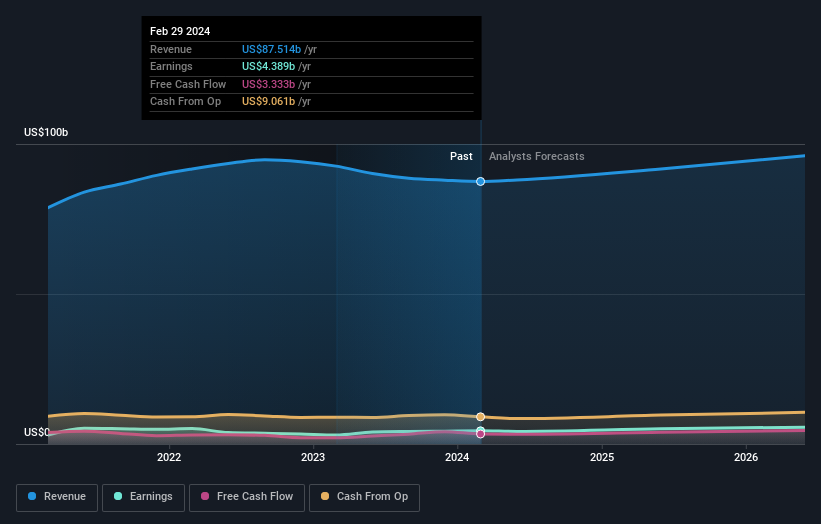Analyst Estimates: Here's What Brokers Think Of FedEx Corporation (NYSE:FDX) After Its Third-Quarter Report
It's been a pretty great week for FedEx Corporation (NYSE:FDX) shareholders, with its shares surging 12% to US$284 in the week since its latest quarterly results. The result was positive overall - although revenues of US$22b were in line with what the analysts predicted, FedEx surprised by delivering a statutory profit of US$3.51 per share, modestly greater than expected. The analysts typically update their forecasts at each earnings report, and we can judge from their estimates whether their view of the company has changed or if there are any new concerns to be aware of. So we collected the latest post-earnings statutory consensus estimates to see what could be in store for next year.
Check out our latest analysis for FedEx
Taking into account the latest results, the current consensus from FedEx's 26 analysts is for revenues of US$91.7b in 2025. This would reflect a modest 4.8% increase on its revenue over the past 12 months. Per-share earnings are expected to climb 18% to US$21.01. In the lead-up to this report, the analysts had been modelling revenues of US$92.2b and earnings per share (EPS) of US$20.94 in 2025. So it's pretty clear that, although the analysts have updated their estimates, there's been no major change in expectations for the business following the latest results.
There were no changes to revenue or earnings estimates or the price target of US$307, suggesting that the company has met expectations in its recent result. Fixating on a single price target can be unwise though, since the consensus target is effectively the average of analyst price targets. As a result, some investors like to look at the range of estimates to see if there are any diverging opinions on the company's valuation. There are some variant perceptions on FedEx, with the most bullish analyst valuing it at US$351 and the most bearish at US$210 per share. There are definitely some different views on the stock, but the range of estimates is not wide enough as to imply that the situation is unforecastable, in our view.
Looking at the bigger picture now, one of the ways we can make sense of these forecasts is to see how they measure up against both past performance and industry growth estimates. We would highlight that FedEx's revenue growth is expected to slow, with the forecast 3.8% annualised growth rate until the end of 2025 being well below the historical 6.9% p.a. growth over the last five years. Juxtapose this against the other companies in the industry with analyst coverage, which are forecast to grow their revenues (in aggregate) 4.4% annually. Factoring in the forecast slowdown in growth, it looks like FedEx is forecast to grow at about the same rate as the wider industry.
The Bottom Line
The most obvious conclusion is that there's been no major change in the business' prospects in recent times, with the analysts holding their earnings forecasts steady, in line with previous estimates. Happily, there were no real changes to revenue forecasts, with the business still expected to grow in line with the overall industry. There was no real change to the consensus price target, suggesting that the intrinsic value of the business has not undergone any major changes with the latest estimates.
With that said, the long-term trajectory of the company's earnings is a lot more important than next year. We have estimates - from multiple FedEx analysts - going out to 2026, and you can see them free on our platform here.
And what about risks? Every company has them, and we've spotted 1 warning sign for FedEx you should know about.
Have feedback on this article? Concerned about the content? Get in touch with us directly. Alternatively, email editorial-team (at) simplywallst.com.
This article by Simply Wall St is general in nature. We provide commentary based on historical data and analyst forecasts only using an unbiased methodology and our articles are not intended to be financial advice. It does not constitute a recommendation to buy or sell any stock, and does not take account of your objectives, or your financial situation. We aim to bring you long-term focused analysis driven by fundamental data. Note that our analysis may not factor in the latest price-sensitive company announcements or qualitative material. Simply Wall St has no position in any stocks mentioned.

